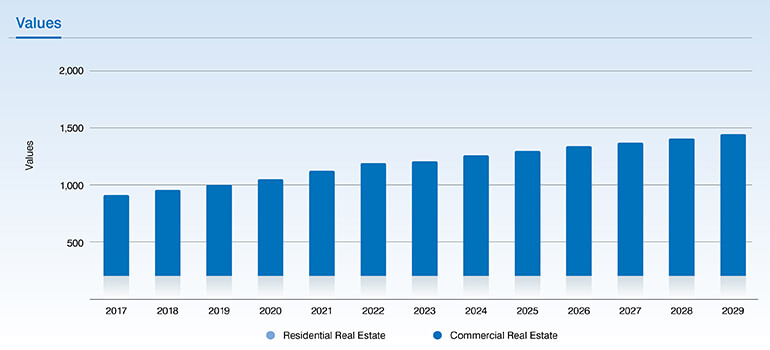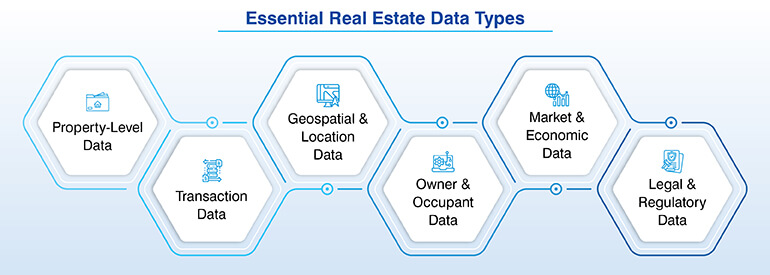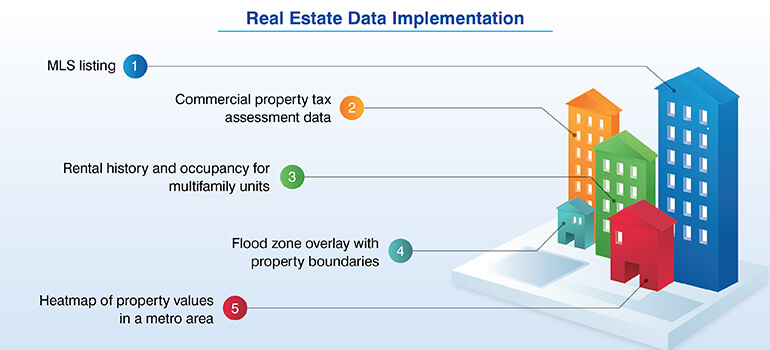10 Powerful eCommerce Data Collection Strategies & Examples
Property evaluations or transactions depend on the quality of real estate data. This data is found in a multitude of sources like private property documents, county office records, MLS listings sites and many more.
Table of Contents
Real estate data drives property investment, development, brokerage and proptech innovation.
This data includes property listings, ownership records, mortgage history, tax assessments, geospatial overlays, zoning maps, and demographic information. Property data providers clean, validate and enrich these datasets to enable predictive analytics, automated valuations, risk modeling, and AI-powered recommendations.

As real estate transactions go digital and data platforms expand, access to quality, standardized datasets has become essential for competitive advantage. The real estate market is expected to grow at an annual rate of 2.69% (CAGR 2025-2029), resulting in a market volume of US$727.80tn by 2029. This significant growth underpins the importance of accurate real estate data in property transactions.
This article covers what real estate data is, examines real-world examples and types of property datasets, and explains how to choose real estate data providers that deliver actionable insights about today’s property market.
Real estate data contains structured and unstructured information pertaining to land, property, ownership and transactions.
Property data providers aggregate and evaluate real estate data information, offering actionable insights into:
Real estate data helps answer several questions that may come up in the minds of buyers and investors related to value of property, timing of investment in a property and the risks involved.
Going ahead, real estate data will be a goldmine of information, helping all stakeholders to stay ahead. It is very important to understand the dynamics of property data for successful transactions.
Want to leverage the power of real estate data?
Real estate data covers a wide range of information points and the most effective property data providers organize these details into structured real estate datasets. Below are the main categories that you will encounter when working with top real estate data providers or building your own real estate database examples.

Property related data includes the physical and descriptive details. Common fields are address, size, number of rooms, year built, building type, and condition. These details form the backbone of any housing market dataset and are found in most public real estate datasets and MLS & listing data sources.
Transactional data provides information such as sales history, purchase dates, sale prices, and mortgages. It is mostly obtained from property records or county-level filings. This data empowers investors to seize new opportunities in both residential and commercial real estate transactions.
In real estate, location of the property is as important as the property. Real estate data sources may include mapping coordinates, school zones, flood zones or zoning classifications. Real estate APIs give a context for investment by combining location data with demographic and neighborhood data.
Ownership and occupancy details show the ownership details of the property, the duration of ownership, and nature of ownership whether it is occupied by owner/tenant or vacant. This type of ownership & title data is important for several purposes such as outreach, property management, and investment property data research.
Market & Economic data indicators include median sale prices, rental rates, inventory levels, and days on market. This data gives quick preview of current conditions. Property market data also includes economic parameters such as interest rates and population growth.
This category covers zoning laws, land use restrictions, property tax assessments, code violations, and building permits. Accurate public real estate datasets in this category helps real estate stakeholders avoid costly legal issues. Many top real estate data providers offer real estate APIs that offer real-time updates this data.
Here are five common examples with its real world implementation:

MLS listings provide the first glimpse of property to the prospective buyer. It provides important details such as property descriptions, square footage, lot size, number of bedrooms and bathrooms, listing price, photos, and days on market.
Government authorities publish assessment records that show property’s value, tax history/past payments and tax rates for property assessment and forecast, as well as long-term cost planning.
Property managers and investors mainly use this form of data to check and review past rent pattern, lease terms, and tenant turnover.
Mapping flood zones against boundaries helps identify properties at risk. This is important for insurance underwriting, development planning, and regulatory compliance.
Heatmap is a visual tool displaying property prices that shows growing areas, zones in demand, and undervalued areas to spot trends.
Ready to improve your agency’s performance with real estate data?
Hitech BPO is a leading property data provider offering mortgage transaction histories, property valuation data points and different types of real estate datasets required for market analysis, planning and investment. They offer key real estate datasets such as Automated Valuation Model (AVM) data, MLS real estate data, Land parcel data, NMLS loan originator data, HOA data, Pre-foreclosure Data, Deed & mortgage data, Real estate listing data, among others.
With 20 million records processed annually, Hitech BPO offers custom solutions based on your business needs. Hitech BPO sources data from proprietary sites and applies processing and validation methods.
Data and Formats: CSV, JSON, API feeds or Excel files
Founded in 1872, The Warren Group is a trusted leader in providing Real Estate & Financial Information. With millions of data points compiled from thousands of sources, TWG offers ownership, property characteristics, sales and mortgage history for properties across the U.S. The Warren Group supports data-driven decisions through advanced analytics, market insights, and comprehensive reporting solutions.
Data and Formats: APIs, data feeds, reports, and analytics.
ATTOM provides real estate property data for around 155 million U.S. properties. There is a range of data such as property, foreclosure, ownership, market analytics, transactions and mortgage.
This tool is known for offering the most comprehensive real estate datasets. ATTOM integrates with developer-friendly APIs, so businesses get property intelligence in their tools and workflows.
Data and Formats: APIs, bulk CSV, Excel, GIS files.
Cotality is a powerhouse in property data, analytics, and workflow solutions. With billions of real-time data signals, AI-driven models, and geospatial information, Cotality helps professionals across real estate, ecosystem to uncover insights, anticipate market shifts and identify risks. Headquartered in Irvine, CA, Cotality rebranded to highlight its mission of delivering “Intelligence beyond bounds”.
Data and Formats: APIs, secure web portals, custom data feeds.
Zillow Data combines all public records, listing details, and proprietary analytics together into a platform that’s easy to navigate for buyers, sellers, agents, and proptech developers. Its well-known Zestimate tool gives instant property value estimates, while its rental and neighborhood datasets give the much needed context for both investment and personal buying decisions.
Data and Formats: APIs, downloadable CSV, on-platform access.
PropertyShark is widely used by investors and brokers for its strength in ownership information, with deep coverage in NY, CA, and other major U.S. markets where localized insights are critical. Unlike many providers that rely on estimates or listing prices, PropertyShark delivers verified sale price data, together with advanced comparables, foreclosure and auction tracking, construction pipeline visibility and comprehensive records on mortgages, liens, zoning and permits.
Buying a generic dataset might come across as an easy option, but in real estate, one-size-fits-all option does not work. Top real estate data providers offer industry expertise. Their experience is not just limited to working on a spreadsheet. They create real estate datasets that are built for purpose, accurate, and ready to use.
Off-the-shelf property market data is designed to meet the needs of a large audience and not for your exact needs. While, a dedicated property data provider can focus exactly on your industry, target market, and your use cases. This means you get highly relevant data right from the start.
It’s common for generic real estate data sources to include outdated or duplicate records. Providers that specialize in real estate data keep their dataset updated by removing errors, validation and conducting periodic checks, saving you hours of cleanup work.
Real estate data provider can help add context to the information, whether that’s zoning information, ownership data, or comparable sales from public real estate datasets and commercial real estate datasets.
Datasets that are set for integration will sync well with your CRM, analytics tools, or dashboards. As the data matches with workflow, you can reduce the time-consuming reformatting step and start working immediately.
Your property data requirements may keep changing constantly. The best real estate data provider would empower you through all stages of growth, adding new geographies, property types, or data points based on your project expansion.
Finding the right property data provider is like finding the right business partner. The better the match, the smoother your decisions will be. But what happens when you find the wrong one? You’ll waste time, dollars and manpower going through incomplete or outdated real estate datasets.
Here are the questions to ask before selecting a right property data provider:
There are several types of real estate data and understanding the importance and purpose of each is the cornerstone to success.
Every type of property data has a distinct role and provides actionable insights that help real estate stakeholders to make data driven decisions. However, the true value of real estate data comes from accurate and structured documents.
In such cases, the right real estate data provider comes into picture. Partnership with an experienced and expert property data provider ensures that you have reliable and scalable support to make smart and data driven business decisions.
What’s next? Message us a brief description of your project.
Our experts will review and get back to you within one business day with free consultation for successful implementation.
Disclaimer:
HitechDigital Solutions LLP and Hitech BPO will never ask for money or commission to offer jobs or projects. In the event you are contacted by any person with job offer in our companies, please reach out to us at info@hitechbpo.com
Leave a Reply